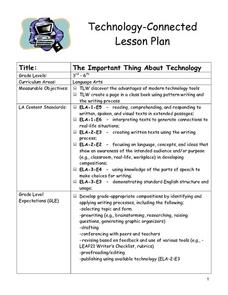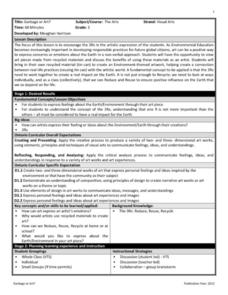Curated OER
What's Happening to Our Caterpillars?
Seventh graders participate in a lesson making observations of caterpillars. They identify different changes in the life cycle of a caterpillar and also understand the final result of the life cycle ending.
Curated OER
The Important Thing About Technology
Students assess the advantages of modern technology tools by creating a page in a class book utilizing pattern writing as well as the writing process. They organize and develop a composition on a selected topic after going through the...
Curated OER
Science: Discovering Sharks
Learners incorporate some basic information regarding ocean life and ecological conservation into their "earth watch" lives.
Teach Engineering
Design and Build a Rube Goldberg
Let's see how complicated we can make this simple task. The last activity associated with a 10-part series has groups design and build a Rube Goldberg machine. Teams determine a simple task to accomplish and use the engineering design...
Curated OER
Creature Features
Young scholars examine why certain animals live in only specific places throughout the world. Using animals, they classify them based on their characteristics and identify their basic needs. They also observe and compare the life cycles...
Curated OER
Family Life
Students investigate the lives of families in two different centuries. They compare the 1600's to the 1800's. Students write an essay about the differences and how they developed in history. Special attention is paid to the external...
Curated OER
Set the Stage
Students observe evaporation in a controlled environment. Evaporation is the change of liquid water into water vapor (a gas). The rate of evaporation is determined by many factors such as air temperature and humidity, liquid temperature...
Curated OER
Lucy the Changing Ladybug
Students listen as the teacher reads "Lucy the Changing Ladybug." Students use construction paper to create a large leaf which they divode and number four sections. Each section will be illustrated to represent one stage of a ladybug's...
Curated OER
Cell Growth and Division
In this biology worksheet, 9th graders identify and explain what cell stay in inter-phase. Then they describe which stage of cell is the shortest and determine why that is true. Students also explain the process of mitosis.
Curated OER
Pay it Forward
Students explore the basic concept of micro-financing. In this economics/literacy lesson, students listen to One Hen by Katie Smith, in which a small loan changes the life of the main character. Students employ comprehension strategies...
Curated OER
Tadpoles
Young scholars examine tadpoles at various stages of development. They make careful scientific observations and compare the changes that occur at five different phases of a frog's life.
Curated OER
Compatible Numbers To Ten
Young scholars solve both addition and subtraction facts and discover the relationship between adding and subtracting equations. Students read real life word problems, extrapolate needed information, and write equations to solve the...
Curated OER
Unchained Memories
Eleventh graders consider what life was like for American slaves. In this primary source analysis instructional activity, 11th graders read slave narratives from Unchained Memories and then participate in a discussion about the...
Curated OER
Air and Water in the Environment
Second graders participate in a three part lesson in which they identify and describe forms of moisture in the environment. Part one of the lesson involves the three stages of the water cycle, part two focuses on creating humidity by...
Curated OER
Pipe Music With Decimals
Learners discuss strategies for solving problems with decimals. They find the sum of problems through recognizing place value and by practicing adding numbers both vertically and horizontally. They read and solve real life word...
Curated OER
How a Blue Crab Changes as it Grows
Pupils explore the BlueCrab Archives website. It includes pictures of a blue crab as it goes through the stages of molting. Students often become confused with the term molting since it is used in different ways in the animal world....
Curated OER
Where Do Green Plants Get Energy?
Fourth graders realize that plants need light, water, and carbon dioxide to carry out photosynthesis. They participate in groups of 4 to plant (with materials provided) a test group of beans to compare to the control group, write a...
Curated OER
Control of Eukaryotic Genes
Covering the molecular interactions involved with DNA packing and the control of gene activity in depth, this slideshow is useful for higher-level biology students. The biochemical components of protein translation are diagrammed and...
Curated OER
Keeping our Water Clean
Second graders discuss how our actions impact the quality of water. In this environmental science instructional activity, 2nd graders watch a short film and discuss the problem of polluted water. Students are then divided into groups and...
Curated OER
Earth Day Number Sense
Elementary schoolers count and order objects using numbers 1-300. They bring recyclable items from home. Young scholars group the items, skip count by 2's, 3's, and 5's, and arrange the items on a number line. Recyclable plastic bags are...
Curated OER
Insects A-Z!
Alphabet insects! Who has ever heard of such a thing? Get ready because your class is going to research insects that start with a specific letter of the alphabet. In small groups, they'll use the Internet and reference texts to locate...
Curated OER
Preparing for High School and Beyond
Eighth graders might be intimidated about going to high school and they may not think they'll ever go to college. Ease those fears while making college readiness an eighth grade reality. In teams, pupils fill out several worksheets while...
Curated OER
Garbage or Art?
The three R's are, reduce, reuse, and recycle. Third graders use recycled materials to design and create an environmentally themed piece of art. They discuss and examine major art works that were created using recycled materials, then...
Curated OER
Looking at the Water Cycle
In this Looking at the Water Cycle worksheet, read an explanation of the water cycle and fill in missing words. Students also create a poster about the water cycle, deliver a weather forecast, and research further questions.

























